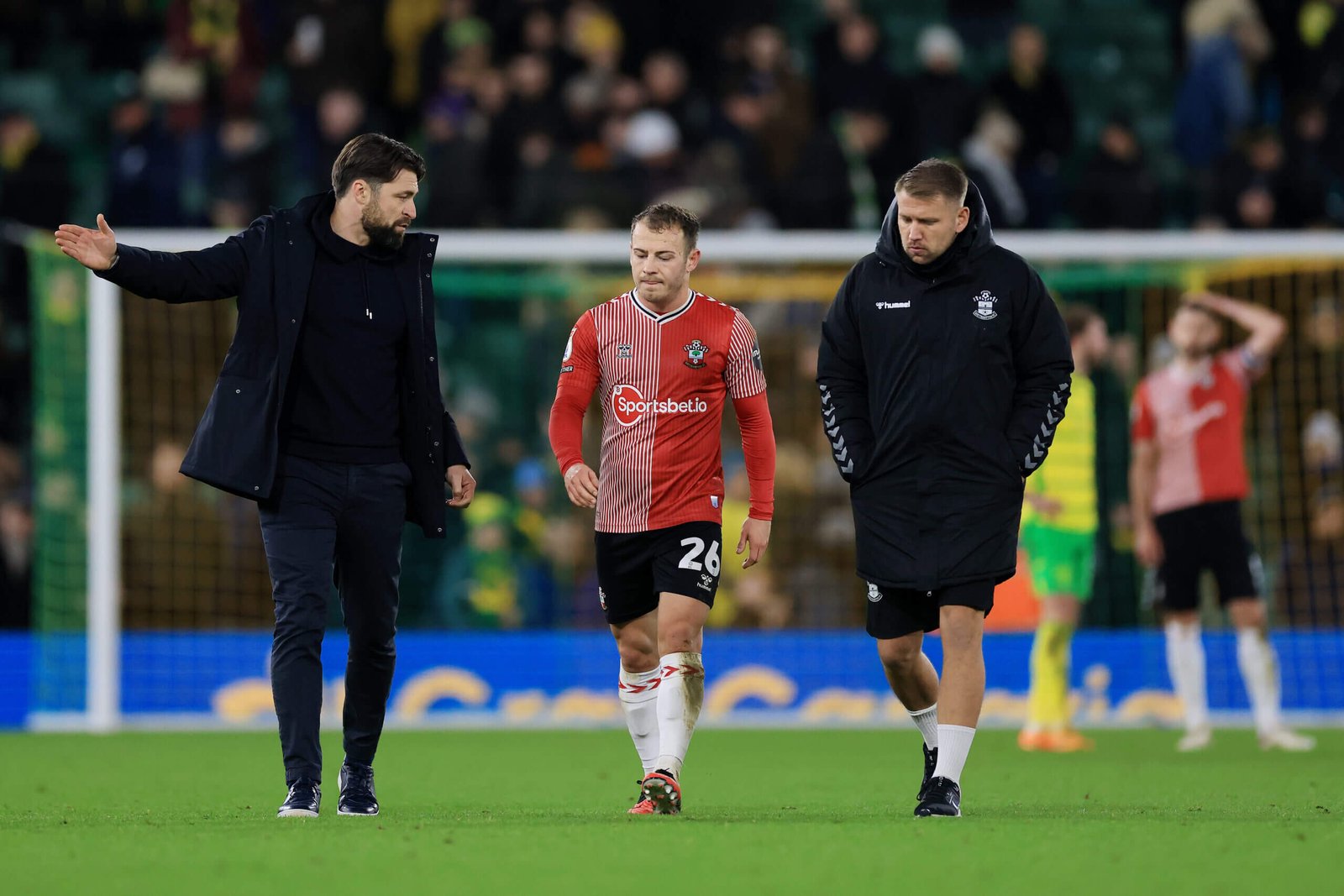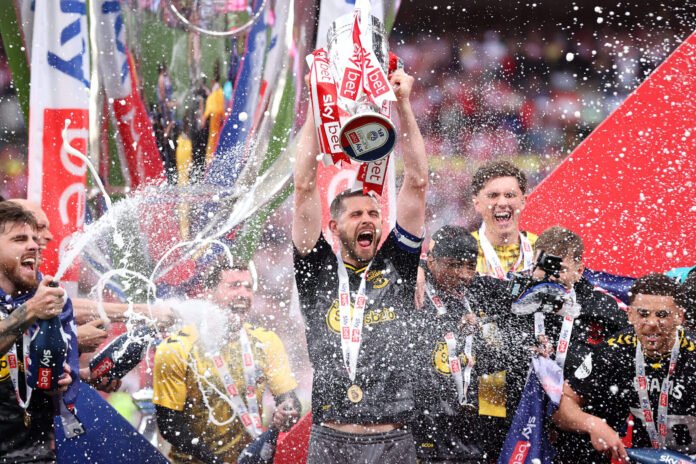Editor’s note: This article was updated following Southampton’s victory in the Championship play-off against Leeds United.
Three days on from the final game of the Championship regular season against Leeds United, Southampton’s hierarchy arranged a boat trip after training.
Spirits were high as players trained at St Mary’s Stadium on May 7. A 2-1 victory at Elland Road had halted a three-match losing streak and the team were heading into the promotion play-offs — the first leg of their semi-final was to be away to West Bromwich Albion — with rediscovered momentum.
Once the session was completed, the squad travelled to the nearby English south coast, where a Sunseeker yacht was waiting for them. Southampton’s ownership group, including Sport Republic co-founder Rasmus Ankersen, lead investor Dragan Solak and other key executives, also made the trip.
Southampton took the yacht across to the Isle of Wight and had lunch at a beachfront restaurant, The Hut. Solak, who one person joked “should have just bought a yacht” instead of the club when relegation from the Premier League was confirmed last season, spoke at the lunch, telling players they would be able to have the party of their lives provided they won promotion via the play-offs.
Southampton have done just that, beating Leeds 1-0 at Wembley thanks to Adam Armstrong’s first-half strike to secure the type of celebration Solak promised.
According to Deloitte Sports Business Group, Southampton will receive a revenue uplift of at least £140million ($178m) across the next three years as a result of their promotion to the Premier League.
It is the third triumph for Southampton manager Russell Martin over Leeds and opposite number Daniel Farke — whom he played under for Norwich City — this season. One was that final-day fixture three weeks ago, and the other came against the backdrop of four successive losses for Southampton last September, with recently-appointed Martin under growing pressure from supporters. Then came Wembley.
Martin celebrates promotion at Wembley (Mike Hewitt/Getty Images)
While the then director of football Jason Wilcox and Sport Republic shared profound faith in Martin, believing he was among football’s best young coaches and would prove himself at the highest level, that 3-1 win against Leeds eased growing scrutiny.
Martin’s first year with Southampton has delivered a cultural shift and an overhaul in playing identity; more personable off the field, more possessional on it. It can, however, be bookended by form deserting his side at the start and at the end of the season, which snuffed out hopes of automatic promotion. In between those dips, Southampton went on a run of 25 league games unbeaten, bringing a winning streak and mindset back to St Mary’s.
This season, Southampton have scored 22 goals in the final 15 minutes of games, more than any other Championship side. Internally, it is being attributed to the depth of spirit Martin has fostered as well as improved coordinated training, where players under his ‘Train how we play’ mantra can maintain a better structure for longer within 90 minutes.
Ryan Fraser’s last-minute winning goals away to Hull City and Millwall and Flynn Downes’ at home to Watford gave credence to the internal notion that the longer a game goes on, the more the odds fall in Southampton’s favour due to Martin’s possession-based, suffocating passing style. His identity makes the opposing team run, stretching the space between units, with fatigue increasingly becoming a factor.

Martin talks to Ryan Fraser (Stephen Pond/Getty Images)
Martin has been described as a “what you see is what you get” character by those close to him. He is relatable for young players, having only retired five years before. He is only 38 years old now.
Arguably his greatest challenge was to win the trust of the dressing room and its senior figures. Upon his arrival, Martin walked into a fractured club devastated by post-relegation redundancies, with unhappy personnel also leaving and several players who appeared despondent and suffering from a confidence crisis.
Incoming staff, speaking on the condition of anonymity to protect relationships, say they entered an environment that was cold and suffering a lack of communication across each branch of the club. Martin inherited 31 outfield players with three goalkeepers and has since expressed publicly that most of them wanted to leave.
Martin likes to have in-depth conversations with players individually in his office, hoping they feel comfortable opening up. He held several one-on-ones with players who had been in a psychologically difficult place after relegation and wanted to leave for a fresh start.
Some said their chief desire was to simply start enjoying football again. That level of honesty struck a chord with Martin, appreciative they felt able to express those emotions. Gradually, others, who were initially more guarded, followed a similar path.
The day after one defeat, Martin spoke to players and staff. Rather than dissect the game forensically at that stage, he shared his more empathetic side. He presented a list of all his own fears in everyday life and why they cause anxiety and doubt. It served as a part of Martin’s wider picture approach, putting football into perspective.
Given he has a big interest in politics, veganism and Buddhism, Martin is a man with a core set of beliefs that he channels into his day-to-day existence.
Changing the mood around St Mary’s was another task that would require patience.
Players were acutely aware of supporters’ negativity — not just related to last season but across several years, with playing at home becoming a subdued, groaning and, at times, apathetic experience.
With piecemeal progress, Martin and the players have worked hard to transform the atmosphere to the point where that strength of feeling crescendoed in the play-off semi-final second leg, with St Mary’s at its loudest in recent memory. The team received a raucous welcome as their coach arrived pre-match, with flares, flags and songs.
Players were taken aback by the level of support, with some excitedly filming the scenes from inside the coach. West Brom’s preparations were then disturbed as they were held up for 15 minutes, waiting for the roads to clear outside the stadium.
To carry out Martin’s ball-dominant style, the squad need a high level of confidence in risk-taking, playing out of tight situations defensively and performing line-breaking passes.
Goalkeeper Gavin Bazunu, before a season-ending Achilles tendon injury in April, was a case in point.
The Republic of Ireland international, who has regularly come under intense criticism, has struggled with his shot-stopping since joining in 2022, with underlying data showing he has underperformed his expected goals against (xGA) metric by 20 goals this season alone. It has contributed to Southampton conceding the 11th most goals of any Championship side, despite their overall xGA total being the fourth lowest.
Martin, though, has continued to defend Bazunu strongly. He has taken a broader look at his side being caught on transition and therefore presenting a higher number of quality chances to the opposition and this was viewed as more of a pressing issue.
Regardless, Bazunu’s distribution when playing out from the back is his greatest strength and is seen to discernibly improve ball progression. Martin’s side have registered the Championship’s joint-second highest expected goals (xG) per 90 minutes (1.73), compensating for the sporadically porous defending.
Rewiring the attacking structure has been illustrative of Martin’s coaching acumen, remedying the disappointment of losing Nathan Tella to Bayer Leverkusen last summer — coaching staff thought he would score 15-plus goals this season if he had remained at the club — by moving Kyle Walker-Peters into a right-wing role when Southampton had the ball and shifting Adam Armstrong, who has been directly involved in 36 goals, the most of any Championship player, into a quasi right-forward. Armstrong has been an unquestionable success story under Martin, trained to make intelligent and incisive out-to-in runs, where he ends up receiving the ball in goalscoring positions.
In January, having pushed for Hull’s Jaden Philogene months earlier, Martin was eventually delivered an archetypal right-winger in David Brooks from Bournemouth, joining on loan and with Southampton inheriting his high Premier League wages.
The delicacy of a Championship play-off final will naturally have consequences on summer plans.
Failure to secure promotion would have meant incurring further losses and financial cuts, owing to the necessity of adhering to profit and sustainability rules (PSR). Key players such as Walker-Peters would have been sold and those on loan who have been vastly impressive and who want to stay — namely Downes and Taylor Harwood-Bellis — would have found it difficult to have permanent deals sanctioned.

Fans at the play-off semi-final home leg against West Brom (Michael Steele/Getty Images)
PSR meant Solak could have not injected more cash even if he wanted to, leaving Martin to work with loans and smaller, more economical acquisitions. For example, it was made clear last summer that Southampton could not shop in the same market as fellow relegated side and promotion rivals Leicester City, who were able to sign England internationals Conor Coady and Harry Winks among others.
There is a general sense that Southampton will be in a better position now promotion is assured, whether it is this season or later down the line. Although the squad will be upgraded, Sport Republic has made acute efforts to ensure continuity, regardless of short-term failure. The school of thought insists staff will know Southampton’s role within football is to establish themselves as a top-10 Premier League side and offer the best platform for young players.
Martin has repeatedly had to contend with other challenges.
Losing Wilcox, who left for Manchester United in April, was a significant blow. The pair had a close relationship and the same footballing beliefs, with Wilcox the club’s biggest advocate for Martin’s appointment. It was hoped to be a long-term relationship but Wilcox departed less than a year into a project that aimed to change the club’s deeper culture. Wilcox is regarded as a professional and media-savvy operator who was popular with staff due to his clear ways of working.
Earlier this week, Southampton sold out their 35,000-seat allocation for Wembley, with the excitement around the city greater and more obvious than in over a decade, going back to when they last won promotion to the Premier League in 2012.
Going up was fundamental in Southampton’s immediate success and to Sport Republic’s multi-club model, which has put in over £300million during its two and a half years in ownership and is awaiting some form of return on its investment.
Yet the level of root and branch reform that has taken place — with Martin and his players the leading influences — has brought broader vindication and now, thanks to football’s richest one-off game, a much bigger reward.
(Top photo: Alex Pantling/Getty Images)
Read the full article here


